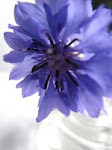I borrowed "Hotel on the Corner of Bitter and Sweet" from the library after reading about it on another book blog. But I think that I would have picked it up just for the title alone. Because don't we all live on the corner of bitter and sweet? And don't we all relate to others experiencing those feelings?
"Hotel on the Corner of Bitter and Sweet" is an excellent title for this novel. It alludes to an actual hotel, the Panama, which plays an important part in the book. The story alternates between 1942 and 1986. Throughout most of the book, the 1942 chapters melt sweetly on the tongue while the 1986 chapters are tinged with not a little bitterness. The flavors coalesce at the end and, taken all together, they make for a fine book.
The protagonist of the book is Henry Lee, who is 12 years old in 1942. It is wartime, and although he is Chinese American, he is often mistaken for the hated Japanese. His father makes him wear an "I am Chinese" button, but this does not prevent him from being taunted by fellow students at the mostly-white school he attends.
A scholarship student, Henry works in the school cafeteria at lunchtime. There, he meets another scholarship student, a girl he immediately likes. Hearing her name as Kay, he thinks she is Chinese, and is shocked to learn that her name is actually Keiko Okabe, a Japanese name! (Although Keiko insists that she and Henry are neither Chinese nor Japanese, but American.) Unfortunately, Henry's father is rabidly anti-Japanese, so this friendship has to be hidden from his parents.
That Henry and Keiko fall in love will be no surprise to readers. But the author doesn't rush things. His portrayal of their budding friendship is tender and endearing to behold. Also wonderful to "behold" are the wartime scenes of Seattle, with its busy seaport, smoky jazz joints, bustling Chinatown and thriving Japantown. Japantown, especially, is shown through a golden filter of memory, because it no longer exists.
Because of the war, Japantown is slowly but surely erased, and because of war, the two friends are separated. Keiko and her family, like the rest of the Japanese people on the West Coast, are taken away to internment camps.
I knew about Japanese internment during the war, but I did not realize what it meant to these loyal American citizens after the war, returning to places that no longer existed, their homes torn down, their possessions gone, their savings stolen, their occupations and businesses wiped out.
At first I did not care for a plot twist that alienates Henry from Keiko, a contrivance that has been used at least as back as far as R. D. Blackmore's 1869 novel "Lorna Doone". However, I decided that given Henry's father's anti-Japanese sentiment and the power he held in his neighborhood, it turns out to be very plausible and effective.
I was a bit upset that the author portrays the Henry of 1986 as acting like an older man, although he is only 56 years old. I caught myself thinking several times that he must be in his 70s at least. But that is a minor irritation. Overall, I thought this was a wonderful book, whether we were in the Seattle of 1942 or the Seattle of 1986, when Henry sets out to find a memento of great sentimental value to himself and Keiko in the Panama.
Along the way, Henry comes to understand his father's motives, and Henry's 20-something, modern son comes to see his dad in a new light.
I mentioned in the beginning that I buy some books, like "Hotel on the Corner of Bitter and Sweet", because of their titles. Some I buy because of their covers, some because they've been recommended to me, some because they are on the bestseller list, some because I've read or wanted to read the author. With "Bitter and Sweet" I didn't know anything about the author until I got to the back end page.
To my surprise, although named Jamie Ford, the author is (at least part) Chinese. He is the great-grandson of Nevada mining pioneer Min Chung who emigrated from China to San Francisco, where he adopted his Western name. I look forward to more books by Ford.






No comments:
Post a Comment